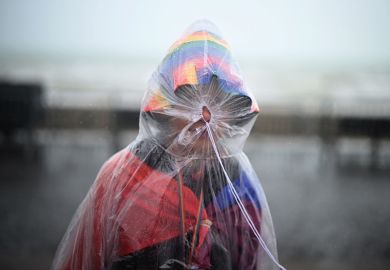Source: Luigi Novi
Supporters of Rightness convey a sense of hope that someday, perhaps impossibly far into the future, all things will be resolved
How do you judge the greatness of a writer? By the number of copies sold? Awards received? Translations of works into other media and other languages? Or is greatness more than that: the ability of the writer to get inside the head of the reader and paint enduringly vivid pictures of invented places, people and events that are “real” in every important sense? By any of these measures, Sir Terry Pratchett was a great writer.
That the announcement via his Twitter account – “AT LAST, SIR TERRY, WE MUST WALK TOGETHER” – was delivered in the familiar, capitalised voice of Death himself (a recurring character in his stories) seemed stunningly appropriate. It left no room for doubt – only a sensation of sudden emptiness. I only met him once, yet because of the impact of his writing I feel as though I’ve lost a close friend.
Unseen University, jewel in the academic crown of the Discworld books’ city-state Ankh-Morpork, has also lost its creator. The raft of memorable, and utterly credible, academic figures, from the terrifying crossbow-toting “archchancellor” Mustrum Ridcully to Ponder Stibbons, the de facto IT manager and sometime keeper of the bizarre cargo-cult computer Hex – not forgetting the engagingly hirsute figure of the librarian (transmuted into an orang-utan in an early novel) – are now adrift without their mentor.
Although the staff of the university seem to take delight in isolating themselves from the lives of the general populace, with a few notable exceptions that often involve drinking, they form the focus that dictates much of the action in the stories. Hints of a relationship between the young Ridcully and an early incarnation of Granny Weatherwax suggest that Unseen University has a sphere of influence that extends as far as the bucolic, witch-rich land of Lancre.
Also key to many of the stories are the characters who seem particularly important to the author: those who have a deep sense of the Rightness of things. Sam Vimes in particular, on his journey of elevation from bitter, drunken Watch officer to Sir Samuel, Duke of Ankh, never loses his innate sense of justice – of what is Right. Set against the frequent dark episodes of the tales, the supporters of Rightness – Vimes, Carrot Ironfoundersson, Granny Weatherwax – convey a sense of hope that someday, perhaps impossibly far into the future, all things will finally be resolved. In the meantime, however, some good people are going to have to get very, very angry. Sadly, we now know that we are never going to see such a resolution from the pen of Pratchett – a man with more right to be angry than most.
The Discworld universe is huge, deep and complex, and it seems almost shocking that so much fruitful imagination could have come from a single person. I was eager to know how Pratchett did it, and managed to meet him in the summer of 2010 when he spoke at the University of Winchester’s Writers’ Conference – a riotously funny and insightful stream-of-consciousness talk that captured and enraptured the audience of wannabe Pratchetts.
Pratchett already knew that he was on borrowed time, and my timid request for an interview was based on anxious hope rather than expectation, but he gave up a generous chunk of his day to talk with me in a dank student bar about the art of writing, childhood, sword-making, the dangers of bureaucracy and other important things (“Fantastic voyager”, 16 September 2010). Then we had lunch, a cheerful dreamlike event with chilled white wine. I’d long wondered if he conversed in the same genial voice that he wrote with, and was delighted to find that he did.
My last glimpse of him was as he was driven away from the university by Colin, his agent, with Rob, his long-term assistant. The sun was shining, the trees were in full leaf and a smiling Pratchett was ensconced in the back seat of the open-topped car, his trademark hat firmly planted on his head, heading home. I don’t want to think of him any other way.
Register to continue
Why register?
- Registration is free and only takes a moment
- Once registered, you can read 3 articles a month
- Sign up for our newsletter
Subscribe
Or subscribe for unlimited access to:
- Unlimited access to news, views, insights & reviews
- Digital editions
- Digital access to THE’s university and college rankings analysis
Already registered or a current subscriber? Login





